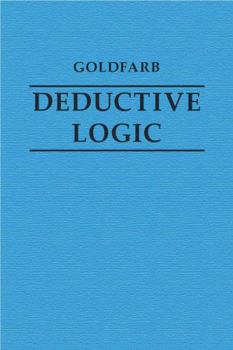Deductive Logic
Select Format
Select Condition 
Book Overview
This text provides a straightforward, lively but rigorous, introduction to truth-functional and predicate logic, complete with lucid examples and incisive exercises, for which Warren Goldfarb is... This description may be from another edition of this product.
Format:Hardcover
Language:English
ISBN:0872206602
ISBN13:9780872206601
Release Date:September 2003
Publisher:Hackett Publishing Company
Length:312 Pages
Weight:1.40 lbs.
Customer Reviews
2 ratings
The best introduction to logic that I know of
Published by Thriftbooks.com User , 20 years ago
I confess I've never seen the published version of Goldfarb's Deductive Logic, but I've held on for more than a decade to his class notes, and that's saying something, given my aversion to accumulating schtuff. The "modern classic" review on this page makes the book sound just like the notes. If so, the review is right on. It's hard to make such a dry subject interersting, to avoid a pedantic tone, to give a cumulative impression (rather than a brute dictum) that the study of logic follows naturally from the universal human duty to think clearly (and maybe even from the more basic duty to live well). Goldfarb manages to do all of this. Read his book.
Goldfarb produces a modern classic.
Published by Thriftbooks.com User , 21 years ago
This is one of the kindest, most avuncular logic books I have ever seen. Every page is evidence of the author's warmth toward his students and his dedication to conveying logic to them in a way that respects them as mature persons. His thorough mastery of the subject and its philosophy is another feature that distinguishes this book from the mountain of logic texts written by inexperienced assistant professors and by persons for whom logic is a mere sideline, not a professional specialty as it is with Goldfarb, an accomplished and respected logician who has been teaching this material for over twenty years. No logic book I know of conveys kind warmth toward the readers or deeply modest non-dogmatic competence in the field more than Goldfarb's 2003 DEDUCTIVE LOGIC. The usual scientistic hocus-pocus, formalistic pedantry and breezy dogmatism are nowhere to be found in this book. Its examples are chosen to appeal to the intelligent humanities student, not merely to the mathematical science or computer engineering student. They are carefully and tastefully crafted to avoid irrelevant linguistic complexities, both logical and sociological. The author took over responsibility for Harvard's legendary introductory logic course Philosophy 140 in 1979 when W. V. Quine retired. A form of Quine's distinctive, if not idiosyncratic, philosophy and organization of logic has been meticulously and creatively implemented. Accordingly, but perhaps to the surprise of readers not familiar with the Quinean approach, deduction in the sense of step-by-step inferring of conclusions implied by given premises is substantially deferred until Section 33 of the books 44 Sections. The 44 sections averaging six pages in length are unequally divided into four Parts titled respectively: Truth-functional Logic, Monadic Quantification Theory, Polyadic Quantification Theory, and Identity and Names. The material in this book has been thoroughly classroom-tested. Most first-edition logic texts are loaded with errors that are exasperating to students and instructors alike. My reading has turned only one (non-exasperating) error: on pages 18, 69, and 289 the space in Augustus De Morgan's last name is omitted. Despite an honest effort to detect further errors typographical and otherwise the reviewer, to his amazement, has found none. If a college instructor wants to present a Quinean form of modern first-order logic with identity and names but without functions in a competent, accurate and thoughtful way while avoiding patronizing spoon-feeding, this might be the best text. No other book I know comes close. On the other hand, if an instructor wants to convey the sometimes agonizing rough-and-tumble of contemporary or historical philosophy of logic, or the astounding struggles, dead-ends, missed opportunities, lapses in objectivity and embarrassing errors, even inconsistencies, involved in the historical development of currently accepted versions of the science painfully bor





